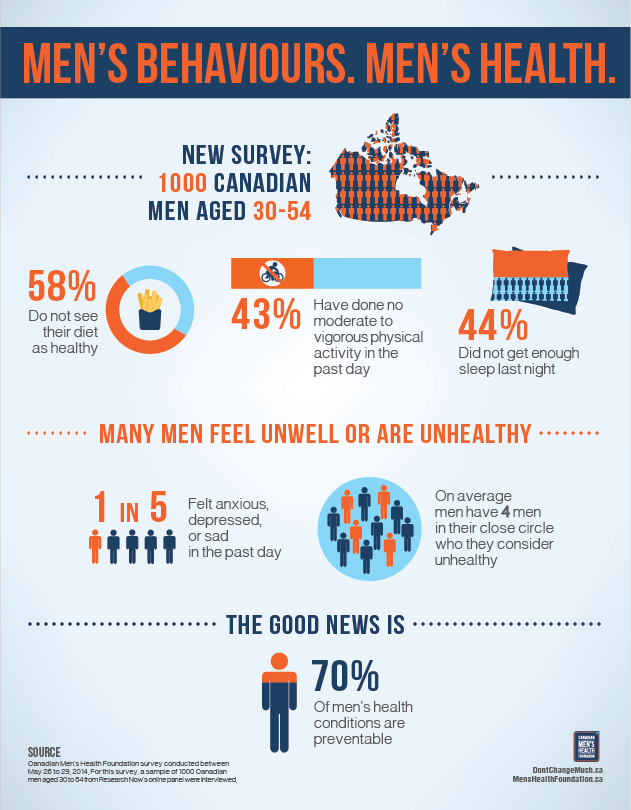Vancouver—In a new Canadian Men`s Health Foundation (CMHF) survey of 1000 Canadian men between the ages of 30 and 54, well over half (58%) did not see their own diet as healthy, 43% have done no moderate to vigorous physical activity in the past day and 44% did not get enough sleep last night. The Men’s Health Behavior Report also shows many men feel unwell. One in five of the men surveyed (20%) felt anxious, depressed and/or sad in the past day. On average, they have four men in their close circle of friends, family or co-workers who they consider unhealthy. “We know men have some serious health issues,” says CMHF founder Dr. Larry Goldenberg. “And men appear to know it as well.” Goldenberg adds, “While the survey findings are concerning, 70% of men’s health conditions/diseases are preventable. We need to help men make changes to live healthier.” CMHF recently launched a national campaign to get men to change some of their behaviours—but not that much. The www.DontChangeMuch.ca site uses ‘champions’ and humour to speak to guys in ways they will hear, absorb and act on. The goal is to get them to make small changes that can make a big difference in how they feel and their overall health. Some additional findings from the survey:
- 69% of the men surveyed consumed something high in sugar and/or sodium in the past day, significant because men are 57% more likely to die from diabetes than women and 79% more likely to die from heart disease.
- 59% of men surveyed did less than 30 minutes of moderate to vigorous activity—the recommended daily amount—in the past day. This may be part of the reason 67% of Canadian men are overweight or obese.
Goldenberg says, “We need to get men thinking about their health, and making small changes that become habits, that become a healthier lifestyle.” These are the findings of a Canadian Men’s Health Foundation survey conducted between May 26 to 29, 2014. For this survey, a sample of 1000 Canadian men aged 30 to 54 from Research Now’s online panel were interviewed. The sample was stratified and weightings were employed to balance demographics, ensure that the sample’s composition reflects that of the male population according to Census data and to provide results intended to approximate the sample universe. The survey was offered in English and French to ensure wide inclusion of the Canadian population. While sampling error cannot be estimated for non-probability samples such as the sample used to conduct this survey, a traditional un-weighted probability sample of comparable size would have produced results considered accurate to within plus or minus 3.1 percentage points, 19 times out of 20.







